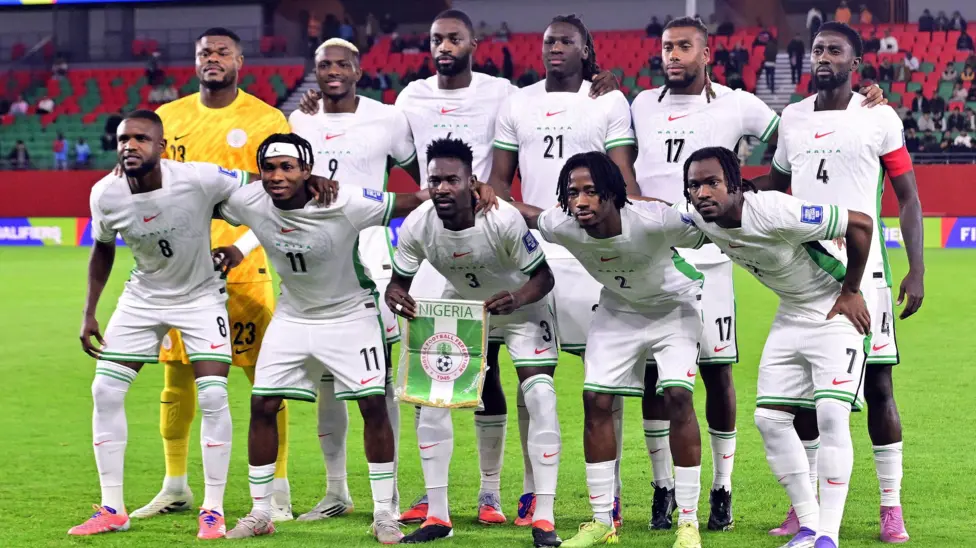Nigeria’s hopes of returning to the global stage at the 2026 World Cup were shattered on Sunday night, ending a turbulent qualifying campaign marked by managerial upheaval, off-field disputes and disjointed performances. A nation accustomed to being one of Africa’s powerhouses must now confront the sobering reality of missing consecutive World Cups for the first time since 1986.
The Super Eagles, ranked fifth in Africa, fell to DR Congo on penalties in the play-off final in Rabat. Frank Onyeka’s early strike had given Nigeria the perfect start, but Meschack Elia equalised before half-time. With Victor Osimhen forced off through injury at the break, Nigeria lost their cutting edge and rarely threatened again. In the shootout, misses from Calvin Bassey, Moses Simon and Semi Ajayi sealed their fate.
Nigeria’s manager, Eric Chelle, stunned observers by accusing a member of DR Congo’s staff of using “voodoo” during the penalties — a claim described as “surreal” by reporters on the ground. Yet the controversy only underscored the chaotic backdrop that has defined the Super Eagles’ campaign.
Their troubles intensified days before the semi-final against Gabon, when players and coaching staff boycotted training over unpaid allowances and bonuses. Fans saw the incident as emblematic of the long-standing administrative failures within the NFF. The team resolved the dispute within 24 hours, and a revitalised Nigeria thrashed Gabon 4–1 after extra time. But the fragile recovery did not last beyond the final.
The deeper issues extend beyond one bad night. Across the two-year qualifying cycle, Nigeria struggled for consistency, especially without Osimhen. They collected just four points from 15 available when the striker was absent, exposing a worrying overreliance on their star forward. Despite being top seeds, they stuttered through a group containing Lesotho, Rwanda, Zimbabwe, Benin and South Africa.
Under former manager José Peseiro, Super Eagles managed draws with Lesotho and Zimbabwe in late 2023 before he departed at the end of his contract. Finidi George briefly took charge, but a home draw against South Africa and a damaging defeat in Benin left Nigeria in a difficult position. Although Chelle was later appointed and oversaw a period of relative stability, Nigeria dropped points at crucial moments, including a last-minute concession against Zimbabwe and a conservative draw away to South Africa.
The play-off berth was only secured thanks to Onyeka’s stoppage-time strike in a must-win match against Benin. But the momentum never fully returned, and the final result reflected the patchy performances that marred the entire campaign.
The fallout in Nigeria has been predictably intense. Fans, journalists and ex-players have criticised both the team’s displays and the NFF’s leadership. Many highlighted the lack of investment in local football infrastructure, contrasting it with the success of players who were developed abroad. “The way Nigeria runs its football is a metaphor for Nigeria’s internal governance as a whole,” journalist David Hundeyin wrote on X.
Elsewhere in Africa, reactions were mixed, with rivals — particularly Ghana — revelling in Nigeria’s elimination. Having missed out to the Black Stars for the 2022 World Cup, the defeat has deepened the frustration among Super Eagles’ supporters.
Attention must now shift quickly to the 2025 Africa Cup of Nations, which begins for Nigeria on 23 December against Tanzania. With just over a month to reset, Chelle’s position will naturally come under review. Though some argue he has begun to build a more structured and cohesive team, failing to deliver World Cup qualification — the primary objective in his contract — puts his future in doubt.
Whether replacing him again would bring stability or deepen chaos is a question the NFF must answer urgently. But one truth is clear: Nigeria must step back, reassess and rebuild. As one supporters’ representative put it, “It’s a wake-up call. We have to go back to the drawing board.”
A return to the World Cup stage may now be delayed until 2030, but for Nigeria, the process of recovery must begin immediately.



